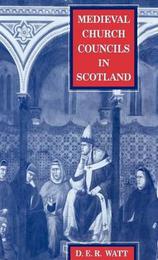
|
Medieval Church Councils in Scotland
Hardback
Main Details
Description
Uniquely in the kingdoms of western Christendom, the Scottish bishops obtained authority, in 1225, to hold inter-diocesan meetings without a supervisory archbishop, and continued to meet in this way for nearly 250 years. Donald Watt provides an authoritative study of these church councils from the Latin and English records based on original sources.In addition to creating an original work of considerable historical interest, Professor Watt brings discussion of the councils and their significance into the broader context of Scotland's political, legal, ecclesiastical and social situation over a long period.An important contribution to Scottish church history and to its influence on contemporary affairs.
Author Biography
Donald E. R. Watt is Emeritus Professor of Scottish Church History at the University of St Andrews.
Reviews"Ce livre est une contribution importante a l'etude de l'influence de l' Eglise ecossaise sur les structures socio-politiques plus larges du bas moyen age." --Revue d'Histoire Ecclesiastique 96.3 "This scholarly volume presents a broadly chronological analysis of the working of Scottish provincial councils both as agents of ecclesiastical reform and as institutions firmly embedded within the political structure of the realm and subject to at least a measure of royal control. In making a contribution to a major international series, Watt has had to grapple with the notorious deficiencies of the Scottish source material and the problems of its interpretation . . . Watt is to be congratulated on presenting the first full analysis of an organ of the Scottish Church which certainly functioned more smoothly without an archbishop than it was ever able to after 1472."--Ecclesiastical History 53.1 "This simple but important story is here worked out on the basis of a meticulous criticism of the original sources."--Theologische Literaturzeitung Redaktion "The detailed account of this institution which Donald Watt provides is, moreover, an impressively sustained piece of scholarship. The main body of evidence, the extant diocesan and provincial statutes, is bristling with interpretive challenges." --The Journal of Religious History
|